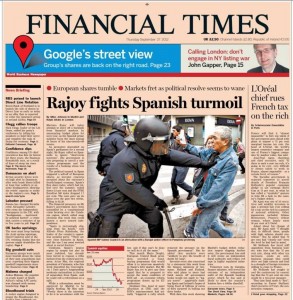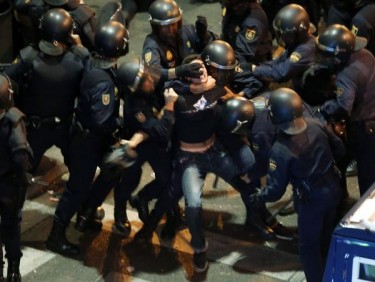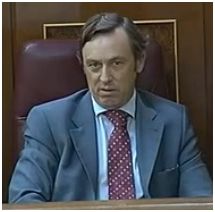This post is part of our special coverage Europe in Crisis.
On October 5th Judge Pedraz's decision [es] to close the case against eight people detained as a result of the 25-S demonstrations in the area surrounding Congress because he could see no indications that a crime had been committed was made public. The Judge's writ criticises politicians, referring to “the perceived decline of the so-called political class.” Amongst other things, in Judge Pedraz's decision we can read:
El hecho de convocar bajo los lemas de rodear, permanecer de forma indefinida …, exigir un proceso de destitución y ruptura del régimen vigente, (…) e iniciar un proceso de constitución de un nuevo sistema de organización política, económica o social en modo alguno puede ser constitutivo de delito, ya no solo porque no existe tal delito en nuestra legislación penal, sino porque de existir atentaría claramente al derecho fundamental de libertad de expresión (…).
“The fact of organising, under the slogan of surrounding, remaining indefinitely…, demanding a process of dismissal and breaking off with the current regime, (…) and initiating a process of creating a new system of political, economic or social organisation can in no way constitute a crime, not only because no such offence exists in our penal legislation, but because should it exist, it would clearly threaten the fundamental right of freedom of expression (…)”.
These words have not been at all well received in government circles, where the Congress
spokesperson Rafael Hernando, in declarations made to Europa Press [es] described the order as “indecent and unacceptable,” and said of the judge that “although he intends to come across as an anarchist ‘pijo’, in reality he is a judge with all the attendant responsibility” (pijo means big-headed, vain, snobby). He also holds him responsible for “any act of intimidation, harassment or aggression which may take place against any representative of national sovereignty.”
This outburst has prompted a great deal of response on the social networks, where the hashtags #pijo, #25s and #hernando became Trending Topics that very afternoon, and on #pijoacrata [posh anarchist], we can read tweets like these:
@GonzoBrios: César, los que vamos a morir acatamos tus resoluciones y no las cuestionamos, pero eres es un #PijoÁcrata.
@GonzoBrios: Cesar, we who are about to die obey your resolutions and do not question them, but you are a #PoshAnarchist.
@jcmisanz: Si eres capaz de decir 3 veces sin respirar “Decadencia de la denominada clase politica” eres un auténtico #PijoAcrata Que lo sepas #25s
@jcmisanz: If you're capable of saying “Decline of the so-called political class” 3 times in a row without breathing, you're a true #PijoAcrata Just so you know #25s
@ROMANSVQ: Wayoming en El Intermedio ha dado en el clavo al dar la definición de #pijoacrata: el pijo que no cree en Dior
@ROMANSVQ: Wayoming on ‘El Intermedio’ has got it just right in giving the definition of a #PoshAnarchist: a posh bloke who doesn't believe in Dior [a play on the Spanish ‘Dios’ for God]
The deputy tried to clarify his words on his Twitter page:
@Rafa_Hernando: La valoracion como acrata pijo del juez Pedraz no es un insulto personal sino la descalificacion d un grave e irresponsable auto
@Rafa_Hernando: My description of Judge Pedraz as a posh anarchist is not a personal insult but the disqualification of a serious and irresponsible writ
This provoked even more responses from internet users:
@LuciaMOdriozola: El #pijoacrata no era el juez, sino el auto. Pues si llega a ser un descapotable…
@LuciaMOdriozola: So the #PoshAnarchist was the writ not the judge. Imagine if it had been a convertible… [play on the word ‘auto’, which can mean both ‘writ’ and ‘car’ in Spanish]
It is not the first time that the deputy Rafael Hernando has made the headlines for his unorthodox behaviour. In 2005 he almost assaulted Alfredo Pérez Rubalcaba [es] in the corridors of Congress shouting at him “You don't say that to my face,” and it was only the intervention of two colleagues which prevented him from doing so. On September 12th, he appropriated the words of the writer Ortega y Gasset to insult the IU [Izquierda Unida, a left-wing party] deputy Alberto Garzón, saying: «(…) one does not come to this Parliament to play a clown, nor a tenor, nor a wild boar. I regret having to repeat to you today, in the same terms, this reference,” as one can see in this YouTube video [es].
Some internet users interpreted Hernando's comments as a threat against Judge Pedraz, recalling events which took place with Baltasar Garzón, whose persecution by certain far right groups and animosity from the most reactionary sectors of judicial power have succeeded in removing him from his career as a judge:
@rafagutterman: El facherio irá ahora a por el Juez Pedraz, al igual que hicieron con Garzón. #PIJOÁCRATA#abortemosalPP#aPPorEllos#25s#7Oyovoy
@rafagutterman: The right will now go for Judge Pedraz, just like they did with Garzón. #PIJOÁCRATA#abortemosalPP#aPPorEllos#25s#7Oyovoy
JJM also sees certain parallels between the two judges in his comment on eldiario.es:
Máximo respeto a las decisiones judiciales – siempre que hagan lo que ellos quieren. Al que no se deja instrumentalizar, o es un “pijo ácrata” (qué esfuerzo dialéctico, no le habrá visto pinta de ‘togaflauta’) o se le monta un proceso por prevaricación.
Greatest respect for judicial decisions – as long as they do what they want them to. Those who don't let themselves be manipulated are either “posh anarchists” (what a dialectical effort, he must not have seen him as a ‘togaflauta’) or are prosecuted for prevarication.
This polemic arises in parallel with the controversy provoked by the declarations of the government delegate to Madrid, Cristina Cifuentes, who would like to «modulate» the right to protest [es] (supposedly in order to avoid disturbances to residents of Madrid). Besides, the Euro deputy Mayor Oreja became a trending topic [es] when he said that he believes that it is “foolish for all problems of public order to be televised with television cameras, because they incite people to protest,” and President Rajoy expressed his “recognition for the majority of Spaniards who do not protest,” which also provoked a new avalanche of tweets [es].
With this state of affairs, it is hardly surprising that many Spaniards believe that their liberties are threatened by some politicians who do not like criticism and whose only option appears to be to silence them by force if necessary. As Félix Población says in his blog Diario del Aire:

Front page of the Financial Times on September 27th. Image from the Facebook page «Asamblea virtual»
Cabe la posibilidad, también, de que al emplear el término modular doña Cristina haya querido utilizarlo (…) con la intención acaso de que sean convocadas en Los Monegros o cualquier otro despoblado ámbito de la geografía patria.
A tales emplazamientos no podrían acceder, por supuesto, los medios informativos, según prescripción de Mayor Oreja, de modo que se estimulara así la mayoría silenciosa que tanto valora Mariano Rajoy (…) y toda reivindicación fuera equiparable con un clamor en el desierto.
It is also possible that in using the term modulate, Cristina meant to use it (…) with the intention perhaps that protests would only be called in Los Monegros or some other deserted area of the national territory.
Of course, the media would not be able to access these places, according to the orders of Mayor Oreja, and in this way the silent majority which is so appreciated by Mariano Rajoy would be encouraged (…) and any complaints would be like a cry in the desert.
The behavior of the police during the protests held between September 25th and 29th has attracted severe criticism because of the violence used to suppress protestors, the vast majority of whom were peaceful. This has been reported upon by international media sources such as Aljazeera, the BBC, the Guardian, Euronews [fr] and the Financial Times (see image). The people have not been discouraged, however, with more protests already scheduled for October 13th.
This post is part of our special coverage Europe in Crisis.








